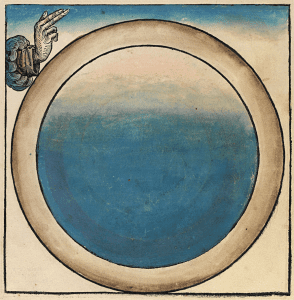 Creatio ex nihilo, creation out of, or from, nothing, was an important theological point made by early Christians as a way to preserve the absolutely unique dignity of God. It was, in many respects, another way to say there is only one God, one absolute besides which there is nothing else with him in his eternity, echoing the words of Isaiah the prophet:
Creatio ex nihilo, creation out of, or from, nothing, was an important theological point made by early Christians as a way to preserve the absolutely unique dignity of God. It was, in many respects, another way to say there is only one God, one absolute besides which there is nothing else with him in his eternity, echoing the words of Isaiah the prophet:
I am the LORD, and there is no other, besides me there is no God; I gird you, though you do not know me, that men may know, from the rising of the sun and from the west, that there is none besides me; I am the LORD, and there is no other. I form light and create darkness, I make weal and create woe, I am the LORD, who do all these things (Is. 45:5-7 RSV).
Christians explained creatio ex nihilo, indicating God’s unique creative power and authority, as a way to combat not only the errors they believed was contained in various forms of pagan polytheistic religious traditions, but also against various so-called Gnostic authorities who suggested that the world and all that was in it was created by an ignorant demiurge (and not the absolute transcendent God). In the way Christians made their cases against their opponents, the point was simple: there was no rival to God, no secondary power equal to him: if there were, he would not be God. The world and all that is in it was not just made out of some eternal material shaped and formed by God (or a demiurge). If this had been the case, God would not be God, that is, the transcendent absolute, but some limited, secondary form of being which existed side by side with uncreated matter. In arguing against polytheism, Christians would note that even the philosophers recognized that there had to be one ultimate transcendent absolute foundation behind all being. Proclus, for example, said that the “one” had to exist before the “many,” because the “many” participated in the one.[1] Thus, as St. Bonaventure explained, Christianity teaches one God who granted the world its existence in time, creating all of time and space through his creative power without any aid from anyone else:
We must understand the following statements about the production of things, for by them truth is found and error refuted. When we saw the world was made in time, we exclude the error of those who posit an eternal world. When we say the world was made out of nothing, we exclude the error of positing an eternity with regard to the material principle. When we saw the world was made by a single principle, we exclude the error of the Manichaeans, who posit a plurality of principles. [2]
When we say “in the beginning, God created the heavens and the earth,” we do not have to believe all that we find in creation was established within one instant of time. Clearly, it did not. Time and space were created together. God gave creation its inner principle, allowing it to form and shape itself; but as grace perfects nature, so through time, the grace which rendered creation its existence continued to be given to creation, allowing it to continuously transcend itself, bringing in new, greater forms. For God, granting the grace of existence (and so origination), and granting further grace to those within the realm of being, allowing them some form of self-transcendence, is one and the same act: the act of creation and the perfecting of creation is one for God, even if it seems to be two separate things to those who exist in time. This is because there is no time for God: he gave time its existence, and so transcends it. For God there are is no succession of events; there is but one act. It is only for those within time, that time exists, and creation then is seen existing in a sequence of events which emerge through an extremely long length of time.
While much can be said about this interpretation of creatio ex nihilo, which is, likewise, the foundational interpretation and the original intention of the phrase, there is another way which the phrase can be interpreted, and has been interpreted, after further reflection. This secondary interpretation complements the first, and so should not be seen as contradicting it. In it, the focus becomes on what is meant by nihilo, that is, nothing. What is this nothing? This nothing can be said to be not-other than God himself. For God is not a thing; God is not a being among beings; God is not a thing beside other things, but is the absolute transcendent principle which establishes the order of being itself. All things which exist, exist within the order of being. God, because he established the order of being, transcends it; he is not limited to or bound by it. He is not to be seen as a thing.
This realization that God is not a thing, and so the nothing from which all things are made, only came about after much exploration of apophatic theology. For, through apophaticism, it became evident that there are two ways nothing can be interpreted: one which was the absence of being, the absence of existence, because something is less than being itself, and the other is of transcendence, where being and existence are limited as they cannot establish themselves and so must come from some transcendent source which cannot be properly said to be a being. Sergius Bulgakov, explaining this, said that we must also not think of it as nothing in the common sense of nothing:
Every attempt to express the mystery in the concept of being, to measure the immeasurable abyss of Divinity, is hopeless in a fatal way, just as a wave is powerless to lift itself with its surge to heaven, no matter how high it may climb. All properties, all words, all qualities, all thoughts borrowed from this world, no matter how we might potentiate and strengthen them, are absolutely unsuited for the description of that which stands beyond the limits of this world. The unconditional negation of all definitions, of every yes, the eternal and absolute NOT to everything, to each something is supposed by the Absolute as its sole definition: God is NOT-what (and NOT-how, NOT-where, NOT-when, NOT-why). This NOT is not even nothing, insofar as a relation to something is connected with it (for nonbeing is only the fellow-traveler of being, and noting is the shadow of something, but as an independent concept in general it does not exist); It is Super-something. [3]
Thus, in saying God is the nothing from which all things exist, we must not understand this nothing is the deprivation of being, the lesser shadow of being, which is what is intended with the first interpretation of creation ex nihilo, but rather, that God is not a thing in any sense. God is nothing – for God transcends things. Without God granting being, there is nothing, less than being; but through God, being is granted, time and space exists, and things exist.
Other than discussions of God’s transcendence, and word games, some might wonder what value is had in the second interpretation which can be had about creatio ex nihilo. The answer lies with the way nothingness is often interpreted in the first way creatio ex nihilo is engaged. It often becomes treated as a kind of eternal void, which existed side by side with God, which God worked with and established matter. This, however, goes against the whole point of creatio ex nihilo; there is nothing outside of God, nothing which exist independent from God, nothing which can be truly said to be eternal except God himself. By pointing out that God, in a sense, is the nihilo from which creation has come to be, this reinforces the notion that there is nothing outside of God which participates in creation itself. There can only by God. Creation exists in God, from God, through God. There is nothing – not even a void – beside God from all eternity. Even that void, that form of lesser being, exists from God as a result of creation itself.
[IMG=Image from the Nuremberg Chronicle [Public Domain] via Wikipedia]
[1] See Proclus, The Elements of Theology. Trans. E. R. Dodds (Oxford: Clarendon Press, 1963), 3-7.
[2] St. Bonaventure, Breviloquium. Trans. Erwin Esser Nemmers (St Louis, MO: B. Herder Book Co., 1946), 49.
[3] Sergius Bulgakov, Unfading Light. Trans. Thomas Allan Smith (William B. Eerdmans Publishing Company, 2012), 107.
Stay in touch! Like A Little Bit of Nothing on Facebook













